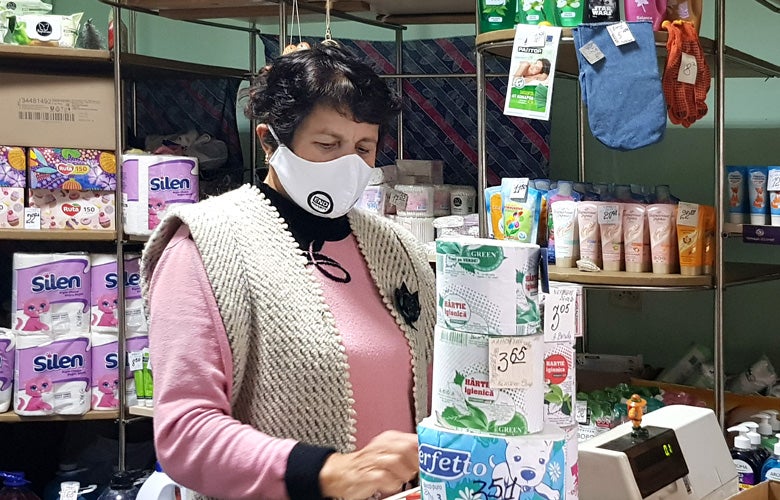In a previous blog, we introduced Viorica C., the owner of a hair salon in Chisinau, and described how COVID-19 had impacted her business and other firms in Moldova. In fall 2020, eight months into the pandemic, we went back to see Viorica and to visit other firms from the 2019 World Bank Enterprise Survey to determine how Moldova’s private sector was adapting to the new normal - against a background of a sixfold increase in the number of coronavirus cases and the worst drought in two decades.
In our latest Economic Update, the World Bank estimated that the recession in Moldova in 2020 would reach 7.2 percent of GDP, with young workers affected the most. Unfortunately and perhaps not surprisingly, businesses were not immune to the ongoing health and environmental crisis.
Although permanent damage to businesses remains relatively low on the surface, employment has been strongly affected. On average, roughly 2 percent of Moldovan businesses have ceased operations, which is half of the average reported in the other 37 countries where a similar survey was administered. The manufacturing sector was less affected than services.
The labor market, on the other hand, has been significantly impacted. The initial shock in Moldova resulted in job losses of nearly 23 percent in May compared to January 2020 levels. And although private sector employment experienced a moderate recovery thereafter, in November it remained more than 10 percent below pre-crisis figures.
Although women were less likely to lose their jobs at the onset of the crisis, the recovery has favored male workers, further increasing the gender employment gap. As the pandemic unfolded, female employment fell by 19 percent between January and May 2020 compared to a 25 percent decline in male employment.
Even though there was a relatively strong reliance on female workers during the crisis, the early recovery process has been more favorable for male workers. Between May and November, net employment increased by roughly 22,600 jobs, out of which close to 19,100 went to men and only about 3,500 to women.
Sales, especially from exports, have been strongly impacted, with small companies bearing most of the brunt. Nevertheless, although sales remain below last year’s levels, by November the impact had eased compared to the initial shock in April. Large firms are recovering much faster than smaller ones. The former had a year-on-year decline of 50.9 percent in April compared to only about 14 percent in October, while small firms, those employing between 5 and 20 employees, experienced declines of around 61 and 34 percent, respectively. The percent of sales through exports in November was nearly unchanged from May 2020 levels and remained well below the pre-crisis level.
Access to finance has become increasingly difficult for the private sector, and again, small companies - the most liquidity constrained - are facing the greatest challenges. By November 2020, about 20 percent of surveyed firms had applied for a loan since the outbreak of COVID-19, and more than one-third of those applications were rejected. Rejections were most prevalent among small firms, with roughly half of applicants not qualifying for credit. This number was significantly lower for medium and large firms, averaging around 15 percent.
Moreover, although both small and medium firms faced similar constraints before the crisis, rejections of loan applications from large firms significantly increased during the pandemic. Nearly half of the firms that did not apply for a loan substantially indicated that they did not need one.
Finally, regional differences have been further exacerbated. Businesses have been adapting their operations to cater to the changing market conditions, and close to half of businesses in Moldova have adjusted or converted their production or provision of services. However, adaptability varies by region, with the northern region lagging behind the other areas on all indicators.
The center, where the capital Chisinau is located, has the highest number of firms that have started or increased online business activities such as sales. The southern region - in which only about 20 percent of firms had a website in 2019, the lowest rate of the three regions - now has the highest percentage of firms that have started or increased remote work. This region also had the highest share of firms that had introduced new products or services, making significant headway in terms of technology adoption.
As the pandemic continues to impact firms, effective government support is as important as ever. When surveyed in May 2020, firms showed more optimism about their ability to weather the crisis. By November, the outlook was a bit gloomier, as the projected timeline for a return to normal levels of sales had shifted, with most expecting this to occur only in mid-2021.
The timing of the vaccine rollout may have further lowered the expectations of the private sector. Yet, only a small share of companies had received government support, as more than half were either unaware of its existence or believed themselves ineligible.
On the one year anniversary of the pandemic’s outbreak, we will re-engage with our sample of firms. We will continue tracking the impact of the crisis to better understand the challenges faced by the private sector and to identify opportunities to ”build back better.” In the meantime, Viorica C. and her peers continue to be in need of effective and well-targeted government assistance to ensure that they do not fall victim to this global crisis.





Join the Conversation